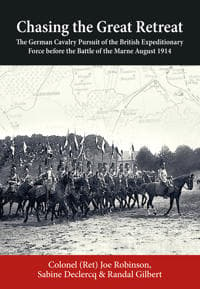
Chasing the Great Retreat
458 kr
458 kr
Mån, 16 jun - mån, 23 jun
Säker betalning
14-dagars öppet köp
Säljs och levereras av
AdlibrisProduktbeskrivning
This is an incredible story of missed opportunities made more astonishing by the amount of propaganda extolled by some British authors. This propaganda line generally purported the story that British firepower dealt a great blow to the German army at the Battle of Mons. Clearly in their eyes, the British won that battle. Much is told about the British soldiers' ability to fire 15 rounds of aimed shooting in a minute, which allegedly the Germans mistook for machine-gun fire. This is a myth that many readers grew up learning. Britain, in fact, lost the Battle of Mons and should have lost the war on 23 August. Germany missed a wide-open door that would have spelled disaster for the BEF and the entire Left Flank of the French army.
We focus on the role of the German cavalry. This arm is seriously understudied and has had little place in some official histories. In general, both British and German works ignore the role the cavalry played in the war. We are talking about the Right Wing of the German army only, consisting of the German First Army, Second Army and two cavalry organizations known as H herer Kavallerie-Kommandeur (HKK 1 and HKK 2 ). The HKK were ad hoc organizations that had never been tested before the war. They are often wrongly referred to as a cavalry corps - the cavalry did not become a corps until 1915 - but neither were they similar to an infantry corps. However, many authors do not understand the concept of the HKK and therefore do not address the cavalry in operational maneuvers. This oversight is truly bizarre: The most mobile forces in warfare are given short shrift. Why?
Artikel.nr.
ad5a5bfe-0a77-4f19-971f-0e5fc0813e9c
Chasing the Great Retreat
458 kr
458 kr
Mån, 16 jun - mån, 23 jun
Säker betalning
14-dagars öppet köp
Säljs och levereras av
AdlibrisLiknande toppsäljare

POP MART Labubu The Monsters – Exciting Macaron Blind Box 17 cm Vinylfigur | Samlarobjekt | Designer Toy | Originalprodukt
179 kr

Apple AirPods 4 Active Noise Cancellation Wireless In-ear
2 094 kr

1 st POP MART Labubu The Monsters Exciting Macaron Plyschfigur Leksak Blind Box (slumpad färg, 17 cm, 1 pack)
179 kr

1 st POP MART Labubu 3.0 Big into Energy Blind Box Figur – The Monsters Vinyl Plysch Hänge 17 cm (slumpad färg, enkel pack)
199 kr

12-pack Oral-B Kompatibla Tandborsthuvuden
89 kr

1 st POP MART Labubu 2.0 The Monsters Macaron Blind Box Plyschfigur (slumpad färg, 17 cm, generation 2, 1-pack)
199 kr

Sony PlayStation DualSense - White (PS5)
639 kr
Tidigare lägsta pris:
679 kr

INF 6-pack trimmerspolar med trimmertråd och lock RYOBI grästrimmer
142 kr
Tidigare lägsta pris:
189 kr

PlayStation 5 Slim Digital Edition (PS5)
5 219 kr
Tidigare lägsta pris:
6 589 kr

Laddare för iPhone 15 / iPhone 16 + 2M kabel Snabbladdare USB-C till USB-C
99 kr
Rekommendationer för dig

Apple Iphone 16e 128GB Svart Svart
7 590 kr

3-Pack - Fidget Spinner med Sugkopp för Barn - Snurrande Leksak
99 kr
Tidigare lägsta pris:
129 kr

X500 Trådlösa Bluetooth Hörlurar - 30 timmar C4U® ANC ENC BT 5.3
269 kr
Tidigare lägsta pris:
399 kr

Vattenfontän solcellsdriven 16 cm solcellsfontän vatten fontän utomhus Svart
149 kr
Tidigare lägsta pris:
179 kr

INF Cocktail set Dubbel shaker 750ml Rostfritt stål Silver 10 delar
289 kr
Tidigare lägsta pris:
385 kr

Playstation 5 DualSense Controller Midnight Black
639 kr
Tidigare lägsta pris:
679 kr

INF TYPE-C Dubbel SD/TF-kortläsare för snabb dataöverföring 0
79 kr

UNIQ XL Hollywood Spegel med 15 LED-lampor och touch-funktion - sminkspegel med belysning - hollywoodspegel
795 kr
Tidigare lägsta pris:
895 kr

INF Poolfilter för MSPA uppblåsbara pooler FD2089 4-pack
265 kr
Tidigare lägsta pris:
353 kr

INF Tillbehör för Roborock S5/S6 modeller 7 delar
149 kr
Tidigare lägsta pris:
199 kr